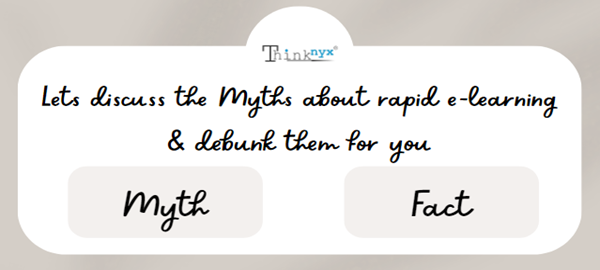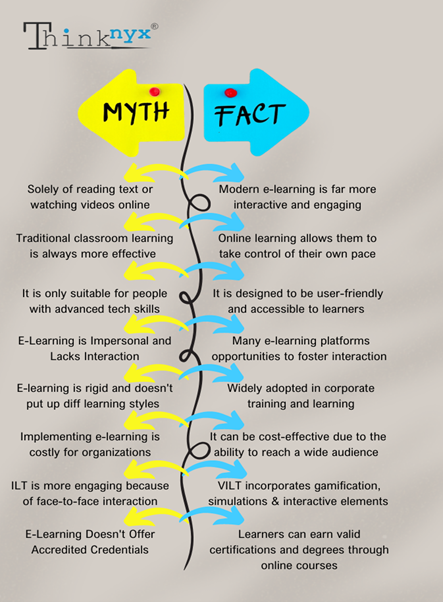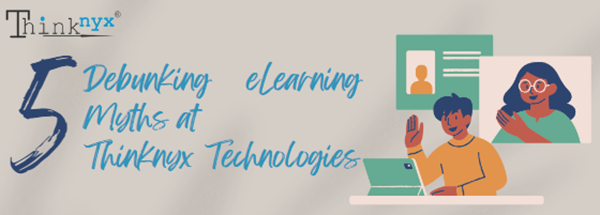Myths in E-Learning: Separating Facts from Fiction
In the ever-evolving realm of education and professional development, e-learning has risen as a prominent contender. However, with its increasing prevalence, a host of myths and misconceptions have also surfaced. These misbeliefs can sometimes dissuade individuals and organizations from fully embracing e-learning as a practical tool for learning and development. To help you make informed decisions, we aim to dispel some common misconceptions surrounding e-learning:

- E-Learning is Just Reading Content Online:
Myth: E-learning consists solely of reading text or watching videos online.
Fact: Modern e-learning is far more interactive and engaging. It includes multimedia elements, simulations, quizzes, discussions, and even virtual reality experiences to create an immersive learning environment.
- E-Learning is Not Effective:
Myth: Traditional classroom learning is always more effective than e-learning.
Fact: Numerous studies have shown that well-designed e-learning can be as effective, if not more so, than traditional classroom learning. Effectiveness depends on factors like content quality, learner engagement, and instructional design.
- E-Learning is Only for Tech-Savvy Individuals:
Myth: E-learning is only suitable for people with advanced tech skills.
Fact: E-learning platforms are designed to be user-friendly and accessible to learners of all tech levels. They often include tutorials and support to help users navigate the interface.
- E-Learning is Impersonal and Lacks Interaction:
Myth: E-learning is a solitary experience with no interaction with instructors or peers.
Fact: Many e-learning platforms incorporate discussion forums, live webinars, and peer collaboration opportunities to foster interaction and a sense of community among learners.
- E-Learning is Inflexible:
Myth: E-learning is rigid and does not accommodate different learning styles or paces.
Fact: Adaptive e-learning platforms can customize the learning experience based on individual progress and preferences, making it highly flexible.
- E-Learning is Only for Formal Education:
Myth: E-learning is primarily used in formal educational settings.
Fact: E-learning is widely adopted in corporate training, professional development, and lifelong learning. It’s not limited to schools and universities.
- E-Learning is Expensive:
Myth: Implementing e-learning is cost-prohibitive for organizations.
Fact: While there are upfront costs associated with developing e-learning materials, it can be cost-effective in the long run due to reduced travel expenses and the ability to reach a wide audience simultaneously.
- E-Learning is Less Engaging than Classroom Learning:
Myth: Classroom learning is more engaging because of face-to-face interaction.
Fact: Engaging e-learning incorporates gamification, simulations, and interactive elements that can rival or surpass the engagement levels of traditional classrooms.
- E-Learning Doesn’t Offer Accredited Credentials:
Myth: E-learning programs donot lead to recognized certificates or degrees.
Fact: Many reputable institutions and organizations offer accredited e-learning programs, and learners can earn valid certifications and degrees through online courses.
- E-Learning is a Passing Trend:
Myth: E-learning is a temporary trend that will eventually fade away.
Fact: E-learning has continued to grow and evolve, becoming an integral part of modern education and professional development.

Debunking Myths in E-Learning at Thinknyx Technologies
Thinknyx Technologies defies common misconceptions about e-learning.
- It’s not ineffective; it prioritizes pedagogical excellence, delivering education as impactful as traditional methods.
- It’s not impersonal; Thinknyx fosters personal connections through virtual classrooms and peer interactions.
- It’s not limited; Thinknyx offers diverse courses across various subjects and industries.
- It’s not easy; learners are challenged with rigorous assessments and assignments.
- And it’s not unaccredited; Thinknyx’s e-learning programs adhere to accreditation standards, providing credible certifications.
Thinknyx Technologies is at the forefront of debunking e-learning myths. Their commitment to excellence, interactivity, and accreditation challenges misconceptions, underscoring the value of e-learning in modern education.

In a nutshell
Despite compelling evidence to the contrary, myths surrounding eLearning persist. These misconceptions can impede the acceptance and efficacy of online education. In contrast to common assumptions, eLearning has the capacity to be equally or even more effective than traditional methods when thoughtfully designed. Additionally, the notion that eLearning lacks interpersonal interaction is inaccurate, as numerous platforms incorporate collaborative features. Furthermore, eLearning’s accessibility reaches a diverse and expansive audience. It is essential to debunk these myths to fully harness the genuine potential of eLearning in both education and training.